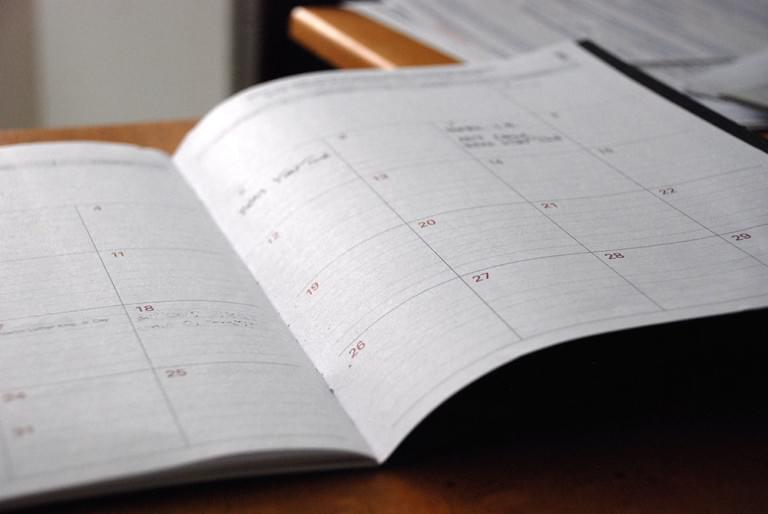
If there is anything worse than no work, it is too much work and too many pressing deadlines. Work overload can make anybody’s life a misery — but you, as a freelancer, have more say over how much work you take and how you distribute the load.
Good scheduling is key for both your successful business and your good mental and physical health.
1. Estimate How Much Work You Can Take
The first step to successfully making a reasonable schedule is to (correctly) estimate how much work you can take. You can’t make a schedule if you don’t know your limits. Though this certainly varies from week to week, you need to have a general idea of many hours a week you have for work.
For instance, can you work 50, 60, or 70 hours a week and still be productive? Or do you have other tasks to consider, such as family/personal matters or health issues, that drastically cut the number of hours you have available per week?
Next you need to decide how you split your schedule between projects. You might try to manage 70 hours of difficult projects at top pay (knowing that you won’t be able to keep this up forever). Maybe you’ll aim to dedicate 10 to 20 hours a week to difficult, lucrative projects and spend the remainder on projects that are less taxing but likely less profitable.
Of course, the projects available to you have a big hand in determining what you end up doing — but knowing your limits, and having a good idea of how you’d like to distribute the work, will allow you to make informed decisions about them.
2. Reject Projects That Will Overload You
It might be hard to say no to a lucrative project but unless you have absolutely no other options, you are better off without certain projects.
For instance, I don’t take full-time projects or projects that require a daily commitment. I’ve done it a few times in the past and it’s way too stressful — it’s like a 9-to-5 job without the benefits.
I also avoid taking projects I am not quite familiar with. These tasks require more research and frequently, even with plentiful research, the end result is far from perfect. It’s simply inefficient to do so.
Sometimes it’s not the project that prompts you to drop a gig — it’s the client. I guess you’ve heard “Poor planning on your side does not constitute emergency on mine”? There are clients who are so chaotic that working with them can turn your schedule upside down. If you land such a client, you’d better get rid of them — you are much better off without the additional stress such a client inevitably introduces in your life.
3. Know Your Most Productive Hours
People are not robots (at least not yet!) and your efficiency fluctuates with time. There are times of the day when you work best and times when it’s a drag. If you were in a 9-to-5 job, you wouldn’t have much control over this, but as a freelancer you can make optimisations based on the factors that have you performing at your peak.
If you haven’t discovered them by now, try to find your most productive hours and schedule the important tasks for then. Your most productive hours could be the mornings, evenings, or at night — you just need to spend a few days paying attention to when you’re at your sharpest.
4. Consider Seasonal Variations
There are quite a lot of external factors that influence your schedule, such as work availability. Though this isn’t set in stone, there are seasons for every industry when there is generally less work available.
For instance, summer is usually slow. Most people (clients included) are on vacation or are simply trying to survive the heat and work is the last thing on their mind.
I’ve also noticed that Thanksgiving to mid-January is typically a dead season. However, a couple of years ago I had a project that started on Dec 31st in the evening. We finished the negotiations at this ungodly time, though quite naturally the actual work started a few days later. While things will slow down around Christmas, you don’t necessarily need to give up on finding work.
Seasonal variations differ from industry to industry and they aren’t constant. A friend of mine is a videographer and for him late spring, all of summer and from Thanksgiving to mid-January is the busiest time of the year — he is practically buried in work in these periods.
There isn’t much you can do to deal with seasonal variation. The best you can do is to plan some rest or work on your own projects during these periods. This way if a good gig appears, you can take it right away.
5. Leave Room for Emergencies
Even if you stop taking clients with poor planning skills, emergencies do happen. And quite often there are tasks that take longer than your preliminary estimates. If your schedule is filled to the limits, it becomes almost impossible to handle an emergency. This is why you need to keep at least 5 to 10 per cent of your schedule free for unexpected work.
If you are not comfortable with scheduling nothing, you can schedule filler projects for then, such as your own projects, which you can drop without a problem if necessary. Also, rest is always an option.
6. Don’t Forget to Schedule Rest
We sometimes get so carried away with work that we forget to schedule rest and time for family, friends, or just ourselves. If you want to maintain your health and good relations with your friends and family, don’t neglect them. Leave some time in your busy schedule for these. Remember the old saying: All work and no play make Jack a dull boy.
7. Learn from What Other Freelancers Are Doing
As a freelancer your schedule is what you make it. It helps when you read about other
freelancers’ schedules because you can learn a lot from them.
Not everything is going to be applicable to you but you’ll be able to pick up plenty of ideas and tips this way. I’ve learned a lot from such articles and it’s much more enjoyable to learn tricks this way than the hard way.
Conclusion
No matter how good your scheduling skills are, it’s not always possible to avoid overload. However, using the simple tips I give you in this article, I believe you can substantially reduce the work chaos and stress in your life.
Ada is a fulltime freelancer and Web entrepreneur with more than a decade of IT experience. She enjoys design, writing and likes to keep pace with all the latest and greatest developments in tech. In addition to SitePoint, she also writes for Syntaxxx and some other design, development, and business sites.






